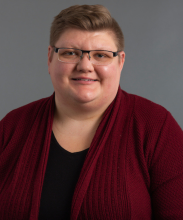About the Host

Dr. Nathaniel Chin is the creator and host of Dementia Matters. He is a geriatrician, memory clinic doctor, and medical director for the Wisconsin Alzheimer's Disease Research Center. His father's diagnosis with early onset Alzheimer’s disease inspired him to pursue a career as a geriatrician and scientist focused on dementia prevention, especially in regard to Alzheimer's disease.
Dementia Matters is a podcast about Alzheimer’s disease and other causes of dementia. Creator and host Dr. Nathaniel Chin interviews leading scientists and caregiving experts to bring listeners the latest in Alzheimer's disease news, research and caregiver resources.
Three Ways to Listen
You can listen to episodes through our website or subscribe to Dementia Matters through ApplePodcasts, Spotify, Podbean or wherever you get your podcasts. You can hear Dementia Matters on Fridays at 4 p.m. (CT) and again at 10 p.m. (CT) during the "Science Friday" segment on WMUU Radio, 102.9 FM in Madison, and streaming online.
Contact Us
Email your questions and episode suggestions to dementiamatters@medicine.wisc.edu.
Audio Editors: Eli Gadbury and Alexia Spevacek
Executive Producer: Caoilfhinn Rauwerdink
Producer: Amy Lambright Murphy
Make an Impact
Like what you’re hearing and learning? Make an impact when you make a tax-deductible gift to the Dementia Matters fund of the UW Initiative to End Alzheimer’s.
Recent Episodes


Dementia diagnoses affect families in many different ways. One of the most challenging to navigate is that of younger-onset dementia (YOD), a form of dementia that affects someone below the age of 65. This diagnosis can be particularly jarring for young families, as resources, support and research for this form of dementia are limited. When Diana Cose’s husband Lorenzo received this diagnosis, she decided to change that by founding Lorenzo’s House, a nonprofit that supports families grappling with younger-onset dementia and works toward lessening the stigma surrounding it. Diana Cose joins the podcast with programs lead Patti LeFleur to share their experiences with younger-onset dementia and how Lorenzo’s House brings light in the darkness.
Guests: Diana Cose, founding executive director, Lorenzo’s House, and Patti LeFleur, youth and lighthouse outreach lead, Lorenzo’s House

What exactly does a mild cognitive impairment (MCI) diagnosis mean, and what should you do after receiving one? Hearing this diagnosis from a doctor can bring up a lot of emotions and questions for individuals and family members. Jennifer McAlister joins Dementia Matters to offer advice for next steps after receiving an MCI diagnosis and share strategies and resources that have been successful for individuals she’s worked with over the course of her career.
Guest: Jennifer McAlister, outreach and partnerships manager, Outreach, Recruitment & Engagement Core, Wisconsin Alzheimer’s Disease Research Center

While there are many kinds of dementia, like Alzheimer’s disease and Lewy body dementia, there’s one that researchers have only recently identified. LATE, or Limbic-predominant Age-related TDP-43 Encephalopathy, is a newly-characterized type of dementia associated with abnormal clumps of a protein called TDP-43. So, what exactly do we know about LATE? Dr. David Wolk joins the podcast to share what key features of LATE are, how it compares to Alzheimer’s disease and impacts treatment, and what next steps are needed to better understand this neurodegenerative disease.
Guest: David Wolk, MD, director, Penn Alzheimer’s Disease Research Center, co-director, Penn Memory Center, co-director, Penn Institute on Aging, chief, Division of Cognitive Neurology, professor of neurology, University of Pennsylvania Perelman School of Medicine

The holidays can be a stressful time for everyone, especially those with dementia and their care partners. In preparation for this season, Dr. Alexis Eastman joins Dementia Matters for our last episode of 2024. Drs. Chin and Eastman discuss strategies for managing the potential stress of holiday traveling and gatherings, important safety considerations and more.
Guest: Alexis Eastman, MD, geriatrician, Senior Medical Director of Ambulatory Medical Specialties, UW Health, associate clinical professor, Division of Geriatrics and Gerontology, University of Wisconsin School of Medicine and Public Health


With the recent surge in artificial intelligence and machine learning technology, one of the most exciting fields it could revolutionize is health care and, more specifically, the field of cognitive care and research. Dr. Marina Sirota and Alice Tang join the podcast to share their research on how AI could be used to predict one’s risk of developing Alzheimer’s disease based on their electronic health records. They also discuss what needs to be done to improve these algorithms and other ways this technology could be used in Alzheimer's disease research.
Guests: Marina Sirota, PhD, associate professor, University of California San Francisco (UCSF), principal investigator, Sirota Lab, and Alice Tang, MD/PhD student, University of California San Francisco, postdoctoral fellow, Sirota Lab

The field of biomarkers is constantly evolving, leading to developments in diagnosing and treating different kinds of dementia, but what exactly are biomarkers and how has our understanding of these measures changed over time? Dr. Henrik Zetterberg joins Dementia Matters to talk about the latest updates in research on fluid biomarkers. Dr. Zetterberg goes in depth on the role and properties of different biomarkers and how new measures and tools, like blood tests, are impacting diagnostic tests for Alzheimer’s and other neurodegenerative diseases.
Guest: Henrik Zetterberg, MD, PhD, professor of neurochemistry, University of Gothenburg, University College London, visiting professor, University of Wisconsin–Madison, Biomarker Core co-leader, Wisconsin Alzheimer’s Disease Research Center

If you're one of the 11 million Americans providing unpaid care to a loved one with Alzheimer’s disease, you know that caregiving is both incredibly rewarding and challenging. What makes caring for someone with dementia so emotionally and physically demanding, and what resources and strategies are available to help? In this episode, Bonnie Nuttkinson joins us to discuss the unique needs of dementia caregivers, tips for navigating each stage of the disease and ways to find support along the caregiving journey.
Guest: Bonnie Nuttkinson, MS, research program coordinator, Wisconsin Alzheimer’s Disease Research Center


What if you could test your cognition from the comfort of your own home using a smartphone? Drs. David Berron and Lindsay Clark have spent years researching cognitive neuroscience, culminating in a 2024 published study investigating the effectiveness of a smartphone app as a tool for detecting cognitive impairment outside of a clinic or research setting. Drs. Berron and Clark join Dementia Matters to discuss how the app and tests were developed, the benefits and drawbacks of this approach and the implications of remote testing in the healthcare field.
Guests: David Berron, PhD, Clinical Cognitive Neuroscience research group leader, German Center for Neurodegenerative Diseases (DZNE), and Lindsay Clark, PhD, licensed neuropsychologist, clinical core co-lead, Wisconsin Alzheimer’s Disease Research Center (ADRC), assistant professor, Division of Geriatrics and Gerontology, University of Wisconsin School of Medicine and Public Health

If you get the recommended eight hours of sleep per night, you spend a third of your life asleep. Why dedicate so much time to sleeping, and how can one get the most out of those eight hours? In this episode, Dr. Allison Reiss joins us for an insightful conversation about how sleep helps the brain, what the brain does while we are asleep, tips for improving one’s sleep hygiene and much more.
Guest: Allison Reiss, MD, internal medicine physician, head, Inflammation Laboratory, New York University (NYU) Langone Hospital-Long Island, associate professor of medicine, NYU Grossman Long Island School of Medicine, member, Medical, Scientific & Memory Screening Advisory Board, Alzheimer’s Foundation of America

Dr. Reisa Sperling returns for another episode of Dementia Matters. After covering her research focused on preclinical Alzheimer’s disease in part one, Dr. Sperling dives deeper into the different factors that can impact cognitive decline and early-stage Alzheimer’s disease and how clinical trials are shaping the field’s understanding of detecting, treating and preventing the disease.
Guest: Reisa Sperling, MD, director, Center for Alzheimer Research and Treatment (CART), co-principal investigator, Harvard Aging Brain Study, principal investigator, Alzheimer’s Clinical Trials Consortium (ACTC), co-leader, A4 Study, co-leader, AHEAD 3-45 Study, professor of neurology, Harvard Medical School

What if there was a way to detect Alzheimer’s disease before clinical signs and symptoms even appeared? Dr. Reisa Sperling joins Dementia Matters for a two-part series covering her research on detecting and treating Alzheimer’s disease at the earliest possible stage, known as preclinical Alzheimer’s. In this episode, Dr. Sperling goes in-depth on amyloid and tau proteins and the implications on early detection and treatment strategies for Alzheimer’s disease.
Guest: Reisa Sperling, MD, director, Center for Alzheimer Research and Treatment (CART), co-principal investigator, Harvard Aging Brain Study, principal investigator, Alzheimer’s Clinical Trials Consortium (ACTC), co-leader, A4 Study, co-leader, AHEAD 3-45 Study, professor of neurology, Harvard Medical School


An expanding field of research is looking at how the gut affects different parts of people’s health, but how does it affect brain health? Drs. Barb Bendlin and Tyler Ulland join the podcast to talk about their 2023 study, which suggests a link between gut health, aging and changes related to Alzheimer’s disease. They discuss their findings on how gut inflammation could impact brain health, as well as explain what it means to have good gut health and how food, medications, where one lives and other factors can impact the gut microbiome.
Guests: Barbara Bendlin, PhD, professor, Division of Geriatrics and Gerontology, deputy director, University of Wisconsin (UW) Center for Health Disparities Research, and Tyler Ulland, PhD, associate professor of pathology and laboratory medicine, UW School of Medicine and Public Health, leader, Ulland Lab


While genetics and lifestyle can influence one’s risk of developing Alzheimer’s disease, other unexpected factors can shift the possibility. One of these factors is personality. Dr. Emorie Beck joins Dementia Matters to share her research on the link between personality and Alzheimer’s risk. Dr. Beck breaks down the Big Five traits that make up someone’s personality and their effects on a person’s cognitive health.
Guest: Emorie Beck, PhD, assistant professor, University of California, Davis

Dementia Matters Special Series: Voices of Research Participants
When Ms. Carol Turner found out her family had a history of Alzheimer’s disease, she wanted to know how she could help herself and others with similar experiences. After learning about the AHEAD Study, which is testing a treatment that could delay memory loss before Alzheimer’s symptoms appear, she signed up to participate in this ground-breaking research. Ms. Turner joins the final episode in our Voices of Research Participants series to discuss her journey as a research participant, how she became an advocate for others in her community and the power of representation in clinical trials.
Guest: Ms. Carol Turner, AHEAD Study participant
Co-host: Sarah Walter, MSc, program administrator, Alzheimer’s Clinical Trials Consortium (ACTC) and Alzheimer’s Therapeutic Research Institute (ATRI)

On this episode of Dementia Matters, Dr. Scott Roberts talks about disclosing genetic test results for APOE, a gene that can increase one’s likelihood of developing Alzheimer’s disease. While this information can be concerning, Dr. Roberts shares that it can empower individuals to take the necessary precautions to lower their risk of developing the disease. He discusses the Risk Evaluation and Education for Alzheimer’s Disease (REVEAL) study, walks us through the APOE disclosure process and shares how it is evolving with the development of new Alzheimer’s treatments.
Guest: Scott Roberts, PhD, interim chair, professor of health behavior & health education, University of Michigan School of Public Health

Dementia Matters Special Series: Voices of Research Participants
What do you do when dementia symptoms begin to upend your entire life? For Brother John-Richard Pagan, the answer was to persist in finding a diagnosis and a supportive community that aligned with his values. In this episode of our Voices of Research Participants series with co-host Sarah Walter, MSc, Br John-Richard describes how he went from a PhD student to a dementia research participant and his journey getting diagnosed with Lewy body dementia (LBD). Br John-Richard also discusses how his background in clinical psychology influenced his participation in research and his advocacy for disabled, LGBTQ+ and other marginalized community members in medical research.
Guest: Br John-Richard Pagan, MS, veteran, monastic, Episcopal Ecumenical Community, advocate, Lewy Body Dementia Association (LBDA)
Co-host: Sarah Walter, MSc, program administrator, Alzheimer’s Clinical Trials Consortium (ACTC) and Alzheimer’s Therapeutic Research Institute (ATRI)

When it comes to dementia diagnoses, the earlier, the better, but why is it difficult to detect dementia in its early stages? Moreover, what strategies can be used to improve dementia detection? Dr. Josh Chodosh joins the podcast to answer these questions and discuss how public health initiatives could improve dementia diagnoses. He also talks about his work with the Building Our Largest Dementia (BOLD) Center, a public health center focused on early detection and ending the stigma around dementia.
Guest: Joshua Chodosh, MD, director, division of geriatric medicine and palliative care, Michael L. Freedman professor of geriatric research, Grossman School of Medicine, New York University, staff physician, VA Harbor Healthcare System

Picture this: you are supporting someone experiencing memory changes as a clinician, support person or care partner while they go through the memory clinic process. How do you navigate the challenging conversations surrounding symptoms, diagnoses, care plans and more that come up? Dr. Toby Campbell joins the podcast to discuss the importance of shared decision-making and share strategies for clinicians, care partners and loved ones to help navigate these important conversations with respect and empathy.
Guest: Toby Campbell, MD, MS, thoracic medical oncologist, chief of palliative care, UW Health, professor of hematology, medical oncology and palliative care, University of Wisconsin School of Medicine and Public Health

Advances in Alzheimer’s disease clinical trials are accelerating rapidly, leading to new insights and disease-modifying therapies, but how does the field continue bolstering that momentum? For Dr. Rema Raman, it’s through improving inclusivity and training for early-career researchers. Recorded at the 2024 Alzheimer’s Disease & Related Dementias Research Day, Dr. Raman joins the podcast to discuss her work in research recruitment and retention, the importance of training the next generation of clinical trialists in dementia research with the IMPACT-AD program and more from her featured presentation.
Guest: Rema Raman, PhD, co-director, Institute of Methods and Protocols for Advancement of Clinical Trials in ADRD (IMPACT-AD), director, section of biostatistics, section of participant recruitment & retention section, Alzheimer’s Therapeutic Research Institute, professor of neurology, University of Southern California

Dementia Matters Special Series: Voices of Research Participants
What do you do if you have a family history of dementia and are experiencing symptoms, but can’t get a diagnosis? Dr. Sara Langer has dealt with just that. In the latest episode of our Voices of Research Participants series, Dr. Langer shares the obstacles she endured to receive her diagnosis of Lewy body dementia (LBD), how her background as a neurologist influenced her search for clinical care and how she turned to dementia research to find answers. She also discusses ways that the field of dementia research could improve to support those with other forms of dementia outside of Alzheimer’s disease.
Guest: Sara Langer, MD, neurologist
Co-host: Sarah Walter, MSc, program administrator, Alzheimer’s Clinical Trials Consortium (ACTC) and Alzheimer’s Therapeutic Research Institute (ATRI)

The brain is the most complex part of the human body, controlling thought, memory, emotion, motor skills, sensory input and all the processes that regulate our bodies. How exactly does it work, and how are clinicians able to determine whether brain changes are a result of normal aging, Alzheimer’s disease, or something else? Dr. Victoria Williams joins the podcast to explain important concepts in neuropsychology, from the difference between cognition and intelligence to how memories are made, and discuss how cognitive tests work in memory clinics.
Guest: Victoria Williams, PhD, neuropsychologist, UW Health, assistant professor, Department of Medicine, University of Wisconsin School of Medicine and Public Health

Since the COVID-19 pandemic was declared by the World Health Organization (WHO) in 2020, there have been many concerns about how cases of COVID-19 and Long COVID or Post-COVID Conditions (PCC) affect not just a person’s physical health, but their cognition as well. In this episode, Dr. Jim Jackson talks about his path into critical illness research and his dedicated focus on unraveling the impact of Long COVID on cognition. Throughout the discussion, he talks about the parallels between Long COVID and other chronic illnesses, the effects of Long COVID across different demographics, the concurrent challenges faced by older adults and more.
Guest: James “Jim” Jackson, PsyD, director of long-term outcomes, Critical Illness, Brain Dysfunction, and Survivorship (CIBS) Center, research associate professor of medicine, director of behavioral health, ICU Recovery Center, Vanderbilt University Medical Center

Hearing loss affects roughly 15.5% of Americans 20 years and older. While the majority of these individuals experience mild hearing loss, the prevalence and severity of hearing loss increases with age. What does this sensory change mean for dementia risk, and can this risk be prevented through interventions like hearing aids? Dr. Frank Lin joins the podcast to discuss the relationship between hearing loss and dementia and share findings from the Aging and Cognitive Health Evaluation in Elders, or ACHIEVE, study.
Guest: Frank Lin, MD, PhD, director, Cochlear Center for Hearing and Public Health, Professor of Otolaryngology, Medicine, Mental Health, and Epidemiology, Johns Hopkins University

Caring for a loved one with cognitive decline can be challenging. While it is a labor of love, burnout is all but inevitable. In this episode kicking off our Voices of Research Participants series with co-host Sarah Walter, Cynthia Sierra touches on her personal experience with caregiver burnout as both a caregiver and research study partner for her mother, who has early-onset Alzheimer’s disease. She also shares her unique perspective on Alzheimer’s disease research as someone who started as a family caregiver.
Guest: Cynthia Sierra, MS, LPC, senior project manager, UT Health San Antonio
Co-host: Sarah Walter, MSc, program administrator, Alzheimer’s Clinical Trials Consortium (ACTC) and Alzheimer’s Therapeutic Research Institute (ATRI)




